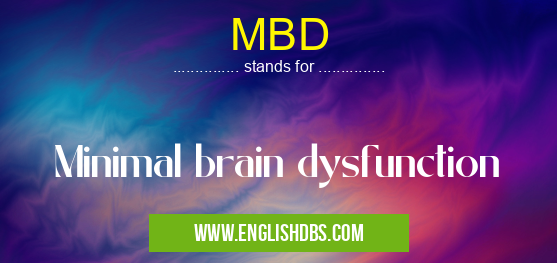What does MBD mean in PEDIATRIC
Minimal brain dysfunction (MBD) is a term commonly used to describe a collection of neurological symptoms. It was once the most frequent diagnosis given to children who had difficulty in school, but has since been replaced by terms like Attention Deficit Hyperactivity Disorder (ADHD). MBD includes symptoms such as impulsivity, aggression, hyperactivity, mood swings, and distractibility. While MBD is no longer used in medical circles, it still plays a role in educational settings.

MBD meaning in Pediatric in Medical
MBD mostly used in an acronym Pediatric in Category Medical that means Minimal brain dysfunction
Shorthand: MBD,
Full Form: Minimal brain dysfunction
For more information of "Minimal brain dysfunction", see the section below.
Definition
MBD stands for Minimal Brain Dysfunction and is an outdated term used by some doctors and educators to describe children’s behavioral issues with attention-deficit/hyperactivity disorder (ADHD). MBD was mainly used during the 1970s and 1980s when ADHD was not yet recognized as a separate medical condition. The acronym MBD was also occasionally written out as “minimal brain damage” at the time, though this isn’t accurate now that we understand ADHD more fully.
Symptoms of Minimal Brain Dysfunction
The main symptoms associated with minimal brain dysfunction are: hyperactivity; impulsivity; distractibility; emotional instability; difficulty maintaining concentration or focus; poor organization skills; problems following instructions; aggression or disruptive behavior. These issues can be both physical and psychological depending on their origin and severity. In addition, these conditions can have an impact on academic performance due to difficulty concentrating or staying focused on tasks.
Diagnosis of Minimal Brain Dysfunction
Diagnosing minimal brain dysfunction involves looking for signs such as trouble paying attention or having difficulty organizing tasks that have been present for at least six months in two or more settings such as at home and school. Other criteria may include displaying behaviors that are developmentally inappropriate for a child's age group or displaying excessive levels of activity compared to other children of the same age.
Treatment of Minimal Brain Dysfunction
Treatment for minimal brain dysfunction typically focuses on addressing the underlying causes of the symptoms through psychotherapy and counseling sessions, medication management, educational support services, social skill training classes, behavior modification techniques, lifestyle changes like better sleeping habits and diet management among others. Evidence-based treatments such as cognitive behavioral therapy (CBT) are also recommended by many specialist providers for optimal results in treating MBD conditions.
Essential Questions and Answers on Minimal brain dysfunction in "MEDICAL»PEDIATRIC"
What is Minimal Brain Dysfunction?
Minimal brain dysfunction (MBD) is an outdated term used to describe a range of neurological, learning, and behavioral conditions that affect children. Typical signs of MBD can include poor attention and focus, difficulty with initiate tasks or behaviors, impulsive behavior, agitation and difficulty following directions.
How do I know if my child has MBD?
If your child exhibits any of the common symptoms associated with MBD, it is important to have them evaluated by a doctor or experienced specialist. This evaluation could include tests such as cognitive assessments or achievement testing. It could also involve physical examination and/or psychological evaluation.
What kind of treatment is available for MBD?
Treatment for MBD will depend on the specific diagnosis made by the doctor. It may involve medications such as stimulants and antidepressants, psychosocial interventions such as behavior therapy or family counseling, school accommodations or modifications, occupational therapy, speech therapy and/or physical therapy.
Does diet have an impact on MBD?
There is some evidence that dietary modifications may be beneficial in reducing symptoms associated with MBD such as hyperactivity and impulsivity. It is a good idea to speak to your doctor or nutritionist about different dietary approaches you can take for your child's individual needs.
Can medication help improve symptoms of MBD?
Medication can be an effective way to manage many symptoms associated with MBD if recommended by the doctor after careful evaluation of the patient’s individual needs. Stimulant medications are often prescribed to address difficulty with focus, impulsivity and hyperactivity while antidepressant drugs might be helpful in addressing certain emotional issues related to MBD.
Are there any alternative therapies available for managing symptoms of MBD?
Yes! Alternative therapies such as music therapy, art therapy or yoga are all methods that may help manage common symptoms associated with minimal brain dysfunction as well as helping build resiliency skills in children who have experienced trauma history. Talk to your doctor about what therapeutic approach might be best for your child’s particular situation.
Can adults experience something similar to MBD?
While not formally recognized under different diagnostic codes than those given to children presenting challenges seen in cases of minimal brain dysfunction (MBD), adults can have similar experiences due to life events leading up to their current situations - including learning challenges along with behavioral difficulties - from which they need assistance recovering their lives back from depression, anxiety, etc so they can reach their full potential again.
Is there one single type of behavior associated with minimal brain dysfunction (MBB)?
No; While certain behaviors might be more commonly found among individuals suffering from minimal brain dysfunctions (e.g., hyperactivity, impulsivity), each person’s experience will differ based on his/her individual circumstances impacting their development during childhood years.
Final Words:
In conclusion, minimal brain dysfunction is an outdated expression used to describe behavioral issues related to Attention Deficit Hyperactivity Disorder (ADHD). The symptoms can include impulsivity, hyperactivity, irritability, mood swings and difficulty concentrating among others which can lead to problems succeeding academically if not addressed properly. Early detection along with evidence-based treatments like CBT can help alleviate certain symptoms associated with MBD however it shouldn't be confused with ADHD which is a separate medical condition altogether.
MBD also stands for: |
|
| All stands for MBD |
